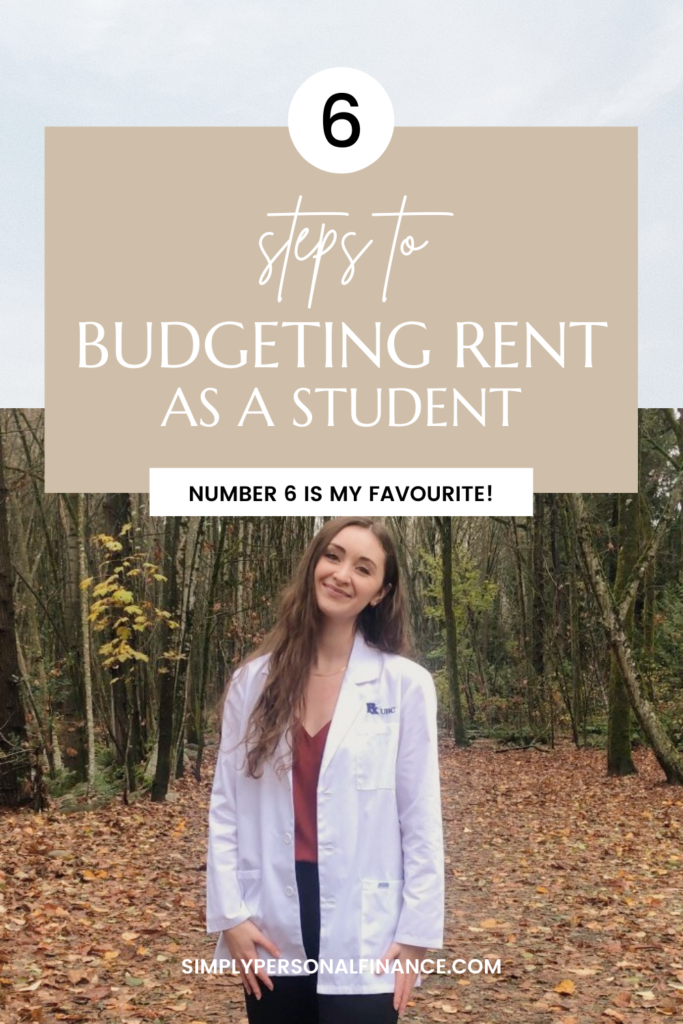It’s quite simple to figure out your rental budget when you’re working a 9-5 job, but what if you’re a student? Every blog post out there tells you to spend no more than 30% or 40% or 50% of your income on rent. However, if you’re not actually making an income, this information isn’t very useful. In this article, I’m going to walk you through how I calculated my maximum budget renting as a student.
Let’s get into it!
1. Find out the average rent in your desired area.
First things first, let’s figure out what the average rent is in your area. There are countless websites, my favourite being Zumper, where you can see the average rent prices in the area you’re interested in for studio apartments, 1 bedrooms, 2 bedrooms etc. Some cities are more expensive than others and being realistic about where you can actually afford to live is important.
Did the average price completely shock you? Do you need to live with roommates while you’re renting as a student? Maybe you need to consider living 10-15 minutes outside of your desired city in another neighbourhood so take note of all of your options at this stage.
I will be looking to rent in Vancouver’s Kitsilano neighbourhood, where the average 1 bedroom apartment is CAD$1,885 at the moment, and the average 2 bedroom apartment is $2,600 (ouch, I know).
2. Check your credit score.
If you’re looking to start renting as a student and you’re not sure what your credit score is, it’s time to find out. Credit scores are a good indication of your financial well-being and some landlords will require a credit check in order to accept your rental application.
My favourite tool to check my credit score is Borrowell. Borrowell provides you with your credit score and your credit report for free! Basically, your credit score tells the landlord how reliable you are as a renter to pay your rent on time. If you have a high credit score above 700, you’re probably good to go in the landlords eyes. If your credit score is lower than 650, your landlord may see you as a risky tenant who may not be able to pay the rent on time. Not every landlord requires a credit check, but it’s important to know your situation before you start looking for your new home.
Learn more at 5 Things That Affect Your Credit Score
3. Find out what financing you have available.
As a Canadian citizen and as student in a professional degree program, I have the privilege of having access to not only federal and provincial student loans totalling up to $20K each year, but also large student line of credit up to $43.8K every year. My tuition itself takes up the first $20K, leaving me with a maximum of $43.8K to spend on rent and everything else that life entails. I definitely won’t be spending all of that financing, but that is simply the total amount of funds I have available to me at this time.
Remember, whatever I borrow now, I will have to pay back at a later date plus extra interest.
So now that you know what funds are available to you, the next step is finding out what the expected minimum payments are going to be upon graduation. Before you get yourself further into student debt, it’s important to think about the implications it will have down the road. I’ve been using Nerdwallet’s Compound Interest Calculator to calculate how much debt I will accrue based on the rent price and the interest rate on my line of credit. Once I know the approximate total debt amount, I can talk to my financial advisor and ask what the expected minimum payments would be. You can also work backwards from a minimum payment standpoint and potentially get your maximum budget based off of that information.
For me personally, my government student loan is interest free until I graduate and then I have 6 months grace period before I have to start paying back the loan. On the other hand, my student line of credit starts charging interest immediately on whatever money I withdraw from the account but gives me a 2 year grace period after I graduate. Interest is still accruing during these grace periods so it would be best to start paying them back as soon as possible. However, I do have a time buffer if I’m unable to find a job after I graduate.
4. Figure out exactly what you want.
Now that you have some background information on the area you want to be in and the finances you have available to you, let’s figure out what you can get renting as a student.
You can browse Craiglist, kijiji, Facebook Marketplace and a bunch of other sites to see what is available in your preferred neighbourhood right now. Before you tour the place, message the landlords. Ask if they have any additional pictures or videos of the unit and if you’re on the tall side, ask about the ceiling height! The last thing you want to do is waste your time going to a showing that isn’t going to work for you in the first place. Do your best to go tour the place in person before signing a lease to make sure it’s exactly what you expected from the pictures.
5. Calculating your maximum student rental budget.
This was the hardest part for me but I was finally able to come to a logical conclusion.
I know I have $43.8K to spend, which can be broken down to $3,650 each month. However, there is no way I am going to spend that much on rent. It’s so easy to look the gorgeous 1 bedroom apartments going for over $2,000 a month because technically, I could afford it with my student line of credit. However, in the long run, I knew future me would be very upset paying down that debt.
So, here’s what I did… I projected forward to what my salary would be upon graduation from my program and calculated a realistic budget based on that number.
Upon graduation from my doctor of pharmacy program, an entry level position would pay approximately $75K annually (or $6,250 per month) before taxes. From there, I can calculate 30% of $6,250 which is $1,875. That price point is quite realistic for Vancouver’s rental scene. Renting as a student, every dollar I can save under $1,875 would be great but that is my hard stop limit.
While the 30% rule is a great place to start, but it may not be a realistic hard limit for you depending on where you live. Another “rule” you can try calculating is keeping all of your fixed expenses (car payments, utilities, etc.) under 55% of your future income, rent included.
6. Negotiating your rent.
Renting as a student can be really tough financially. Even a hundred dollars in savings here and there can really make a difference. If the unit that you’re interested in is higher than the average price in the area, you could try negotiating down your rent. If you do choose to negotiate your starting rent, it’s essential that you show up prepared.
First off, you need to show that you’re interested and go in person to tour the place. It’s going to be a lot harder to say no to a person pleading their case face-to-face than it will be over the phone or an email.
Secondly, while you’re touring the place, ask lots of questions:
- Does the landlord rent out other properties in the city? This tells you whether or not they are seasoned landlords who will definitely value a good relationship with their tenants and appreciate a reliable renter. You could also ask about other units available if you’re interested.
- If the utilities aren’t included, how much is the average cost each month for the unit?
- Does the apartment come furnished or unfurnished?
- Ask about the laundry situation. Is there laundry services available in the suite, on site or not at all? This could be a deal breaker! Same thing with a dishwasher.
- Ask about the perks of living in the area.
Finally, you need to do your research before you show up for the tour and decide what your maximum number is. Here are some things you can show up prepared to offer when you go for a tour:
- Signing a 12, 18 or 24-month lease.
- Giving a few months rent in advance on your move in day.
- Offering to move in early: for example, if you planned to move in Sept 1, try offering to move in Aug 1 in exchange for a hundred or two lower each month.
- Giving up your parking spot: if you don’t have a car or can make it by just using street parking, this could be a great offer for your landlord.
- Bringing references from past landlords to show you’re a reliable renter.
- Bringing a copy of your credit score/report.
- Having examples ready of similar units in the area at lower prices.
Negotiating down your rent by just $100 a month is an extra $1200 saved in a year. Even $50 a month is $600 a year. However, you need to keep in mind that they don’t need to lower the rent for you! Go into the negotiation knowing exactly what you want and be prepared to walk away if it’s not exactly that. Best of luck!
Pin it for later!









Leave a Reply